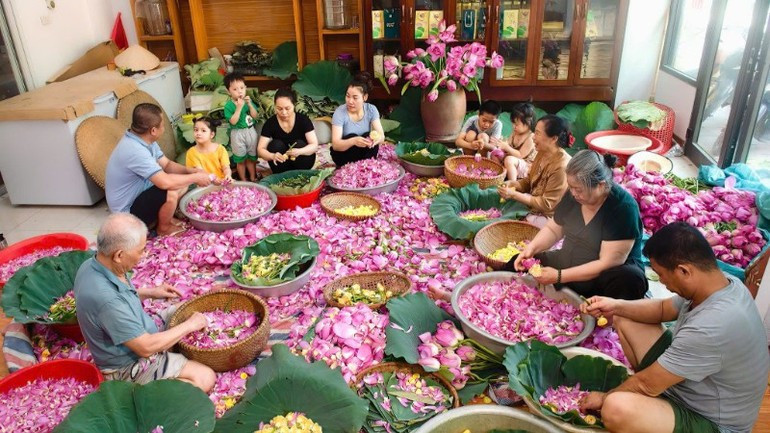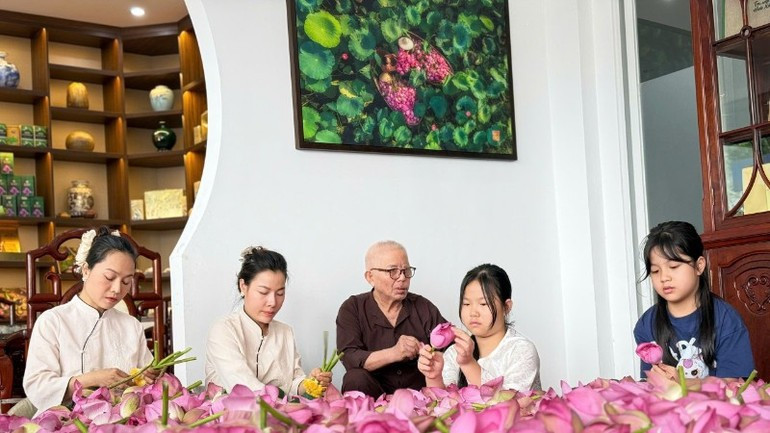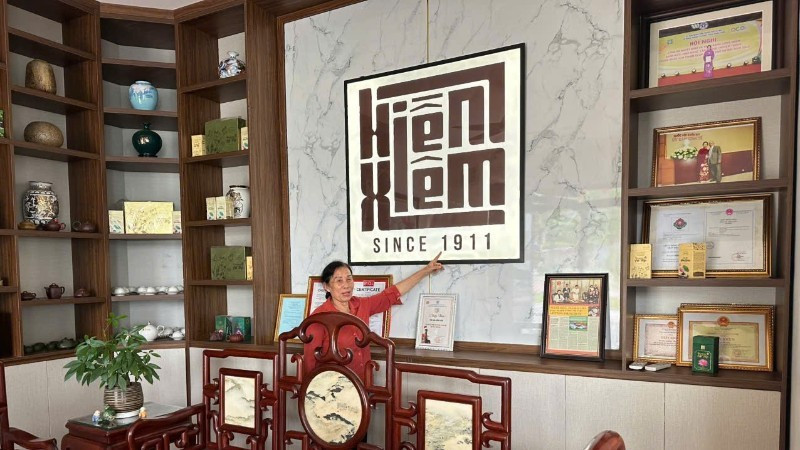The Tay Ho lotus tea product has been recognised as a four-star OCOP product and stands as a symbolic product associated with West Lake and Ha Noi.
Shaping a product brand
According to Nguyen Viet Cuong, Vice Chairman of Tay Ho Ward People’s Committee, the ward (formerly Tay Ho District) is home to numerous OCOP products rated three and four stars. Among them, three standout OCOP products are lotus tea, mooncakes and Ba Ngoai snail noodles. Each product carries its own distinctive character, reflecting the creativity and dedication of local people in preserving traditional flavours while contributing to economic development and promoting the ward’s image to visitors and markets both inside and outside the locality. However, among these outstanding OCOP products, Tay Ho lotus tea holds a particularly special place.
When speaking of the traditional craft of lotus-tea infusion, one cannot overlook Tay Ho Ward (formerly Quang An Ward). Over time, lotus tea has become a source of pride for the local people. However, amid market competition and the labour-intensive nature of the craft, the number of households still engaged in lotus tea making has declined sharply.
Sharing the hardships of her craft, Luu Thi Hien, owner of the “Hien Xiem Lotus Tea” brand, said: “This craft is extremely demanding. We stay up late, get up early, and must carefully tend to every batch of tea dried by hand. During hot days, few can withstand the heat from the charcoal-fired kilns. That is why many families have given up the craft. Without deep passion, one cannot persevere in this profession. I know it is hard work, but I want to preserve my family’s tradition. I am now passing down the tea-making secrets to my children so they can continue the craft.”

Despite the difficulties, local families remain attached to their craft, maintaining and promoting the traditional lotus-scented tea-making craft, which has gradually become a national brand. However, maintaining the traditional lotus-tea infusion craft is already difficult; preserving and developing it in the current socio-economic context is even more challenging. Hien added that her family’s lotus-tea infusion tradition dates back to 1911. Every member of the family, from the elderly to the young, has a specific task — separating petals, drying stamens, and delicately collecting the “lotus rice” grains used for scenting.
Extracting the lotus rice is a difficult task. It must be done gently and skilfully so that the grains do not break or lose their fragrance. The tea is dried using traditional charcoal methods to achieve its unique aroma. To scent 1 kilogram of lotus-tea, between 1,000 and 1,200 lotus flowers are needed — the hundred-petal Bach Diep lotus variety grown in West Lake, which is highly aromatic and rich in lotus rice. The tea itself must be of fine quality and purity. Producing a single batch of lotus-tea requires 21 days of meticulous work, including seven rounds of scent infusion and seven rounds of drying, to achieve the perfect aroma and flavour.
Although producing one kilogram of lotus-tea is arduous and involves numerous stages, the result is a product that the market favours greatly — demand consistently exceeds supply, and prices remain high. However, when asked why she does not expand production, Hien explained that rapid urbanisation has made the waters around West Lake unsuitable for lotus cultivation, depriving producers of the essential raw material that gives Tay Ho lotus tea its distinctive identity.
To secure a stable supply, her family has rented ponds in Bac Tu Liem to grow lotus plants, using seeds from West Lake. However, lotus grown elsewhere lacks the same quality. Previously, 1,000–1,200 West Lake lotuses were sufficient to scent 1 kilogram of tea, but now, 2,000 lotus flowers from other areas are required. As a result, production cannot be expanded, and the rented ponds outside the area are limited in both quality and sustainability.
Bringing Tay Ho lotus tea to wider recognition
Over the past years, with the support of the authorities of Tay Ho Ward and Ha Noi City, Tay Ho lotus tea has been showcased at major events and trade fairs linking provinces and cities. The city and ward have also provided opportunities for the lotus tea to be exhibited and included in the city’s OCOP Programme.
According to Vice Chairman Nguyen Viet Cuong, the local lotus output has been maintained at a stable level, fully meeting the demand for producing OCOP products and supplying both domestic and foreign markets. This not only demonstrates the sustainability of local lotus-tea production but also reaffirms the high reputation and quality of the product. Lotus-based products of the locality are trusted and favoured by consumers both within and beyond the area, and are also provided to central and municipal authorities for use at official events and receptions for international guests. They are widely distributed across markets, reflecting the prestige and quality of the product and contributing to promoting the locality’s image.
To uphold and strengthen the Tay Ho lotus tea brand, Vice Chairman Cuong added that local lotus output continues to be maintained and expanded to meet growing demand for processing and consumption. The lotus grown in the ward meets high standards of quality and reputation, ensuring fresh, aromatic and pure raw materials. This makes lotus-based products a trusted choice for both domestic and international markets, reaffirming their status as Tay Ho’s outstanding OCOP speciality. Thanks to the focus on quality and production processes, lotus-based products have become reliable supplies for central and municipal agencies while expanding their market reach, creating jobs and improving local people’s incomes.

Although lotus materials are not entirely harvested within Tay Ho Ward, those collected from ponds and lakes in cooperative farms are cultivated according to strict standards, ensuring fresh and stable quality. Lotus output remains stable, meeting the processing and consumption needs. The lotus quality is tightly controlled throughout harvesting and processing, with careful selection and proper preservation standards to guarantee safe, reliable products with the distinctive cultural value of the locality. Therefore, lotus-based products have earned consumers’ trust and contributed to strengthening the OCOP brand and promoting the locality’s image both domestically and internationally.
To meet growing production demands and expand the market, Tay Ho Ward plans to develop new lotus cultivation areas by expanding standardised ponds and lakes and collaborating with farming households to supply high-quality, stable raw lotus materials. The harvesting and processing stages are carefully controlled from start to finish, ensuring that the final products meet OCOP standards — fragrant, safe and of premium quality — thereby enhancing the reputation of the local lotus-tea brand.

To elevate the Tay Ho lotus tea brand to the five-star OCOP product, the Vice Chairman of Tay Ho Ward People’s Committee noted that the locality still faces several challenges, such as limited standardised lotus cultivation areas, uneven raw lotus material quality, and stringent requirements for food safety and product quality. In addition, the processing and preservation stages require further improvement to ensure flavour, freshness and uniformity in production.
In the short term, the locality is addressing these issues by providing technical guidance, strengthening cooperation with farmers, and investing in processing facilities and quality-management systems to ensure that products are not only aromatic and safe but also meet OCOP reputation standards, thereby elevating the lotus-tea brand.
In the long term, Tay Ho Ward plans to implement comprehensive solutions, including expanding standardised lotus-cultivation areas, strengthening partnerships with local households, improving processing and preservation methods, and enhancing quality management to achieve the five-star OCOP standard. These measures will ensure products that are fragrant, safe, reputable and capable of elevating the brand value of this local speciality.
















